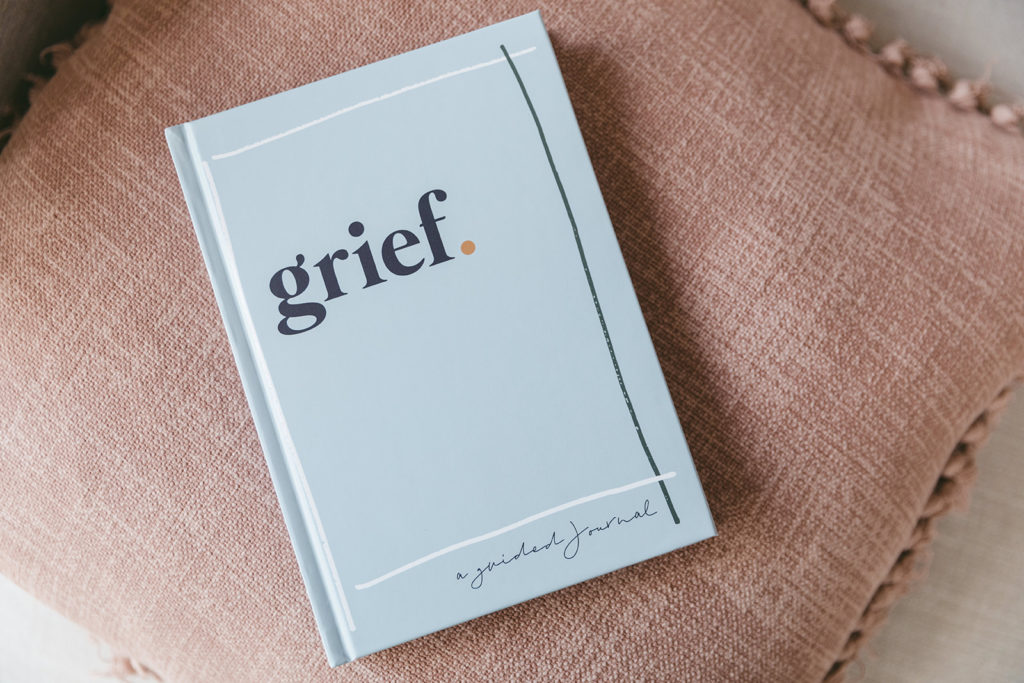After the sudden death of her husband in 2017, everything changed for Jo Betz. Over time, the experience led to her writing and speaking on the subject of grief. The honest, and sometimes humorous way she shares her story offers insight to a subject still considered taboo in our society.
Jo’s book ‘Grief – A Guided Journal’ is both beautiful and powerful, allowing the reader to explore their own feelings and even find meaning and opportunity for personal growth.
Kate Morgan loved chatting with Jo about the book, her experience of grief and planning Craig’s funeral.

Welcome Jo Betz!
My name is Jo Betz and I’m a single mother of a sweet eight-year-old daughter and a widow.
I’m a passionate advocate for giving grief a voice in our community. This came about after the sudden death of my husband in 2017 to an asthma attack. An experience that completely rocked all my foundations and I found myself in the whole new world of grief. I soon realised how isolating the grief journey is and, in a time, when we need connection most, it can be often lacking due to the uncomfortable nature of the topic. I have really wanted to change that so began sharing my own experience through writing and social media. As an extension of that, in 2020 I released a book called ‘Grief – a guided journal’, a proud moment.
But when I’m not talking about grief, I am also a marriage celebrant and have been for over ten years, along with being the co-founder of a digital wedding publication called Ivory Tribe.
Jo, thank you for sharing what you’ve learned and your honest writing about grief. Can you first tell us why you decided to write “A Guided Journal?”
I know how therapeutic writing can be, and I often found myself turning to journals to write down my experiences of what was happening to me after my husband died. However, I was so overwhelmed by blank notebooks, that I sometimes didn’t even know where to start with what I was thinking and feeling and so I’d just put it away. I had also read a lot of books about grief and while I always enjoyed them, they were often about someone else’s experience or perspective, there wasn’t really anything out there that would allow me to explore my own grief, my own unique experience of it. So, I created one!
How does your book help a person in grief?
My book has been designed with gentle writing prompts to help a person explore what they’re thinking and feeling when it comes to their grief. It’s a safe space to journal on a variety of topics. From stages of grief, anger, loneliness, and regret, to connection, kindness to oneself, gratitude and much more.
It was important to me that the writer feels like the journal truly understands what they are going through, so it’s almost like the journal speaks to them and holds their hand through these really challenging emotions.
As hard as it can be, writing allows us to let it all out, with no judgment or positive platitudes. When we allow ourselves the space and time to do this, it often helps us process, learn, grow and hopefully heal. It can have a really positive effect on our wellbeing as we are not bottling up our emotions.
Did being a celebrant alter the way you went about creating a funeral?
I think it absolutely altered the way I thought about my husband’s funeral. I knew the possibilities and I knew instantly that I wanted it to be a celebration of his life, even though we were all feeling so much shock and pain. I wanted it to be personal and unique to Craig, that we could celebrate openly the beautiful life he led.
We love your frank way of speaking about Craig’s death and the situation you found yourself in as a new single Mum. For example in your blog 450 weddings and a funeral you said, “Trust me, I’m getting very used to the awkwardness a dead husband brings to the table!” Is this the most natural way for your to speak about your experience? Does it shock people?
I think Craig’s death brough out a dark sense of humour in me, because if you don’t laugh, you cry!
It might seem strange, but I could see some of the humour in what was happening to me from the very beginning. I’ve always wanted to be honest about my experience – the good, the bad, the ugly. I think having a sense of humour about it has helped me feel more relaxed in some awkward moments, whether that’s to help me cope with it, or to help others feel a little more relaxed in my presence. I’m sure it has shocked some people, but that’s okay, because they might be learning something from me also. That it’s okay to be honest, it’s okay to laugh, it’s okay to cry.
I also feel if I can be open and honest with others, they will then be able to open up and be honest with me, and I certainly feel that has been reflected in some of the incredible interactions I’ve had with people since. It’s as though my world has really opened due to my frankness.
What are the things that stand out in your memory around planning the funeral?
I felt like it was so fast paced and busy, and I honestly didn’t expect that. I found it difficult because I was still reeling from the shock of what had happened, yet I was straight into planning. I know I could have handed the reigns to others, and I certainly designated tasks that I couldn’t do, but I wanted it to have my touch on it and to get what I wanted from it. But it’s hard to grieve, to connect with loved ones, give yourself space and plan a funeral when you have a looming date ahead.
What were you most proud of in terms of the funeral?
Craig’s death was so sad and painful, but I didn’t want his funeral to solely focus on this. I wanted it to focus on the larger-than-life person he was, the fun and the antics he brought to all our lives. The wonderful father, husband, son and friend he was to so many. I was so proud of being able to pull together the right speakers to talk about Craig and his life. I was also hugely proud that on one of the hardest days, I was able to speak and share my love for Craig and poke a little fun at him too. I’ve given a lot of speeches, but it’s that one that I’m most proud of. I know Craig would have loved it.
Are there any parts you wish you’d done differently?
I wish I’d had a better location, but there was nothing available, that I was aware of. It was absolutely fine on the day, when it was filled with people, but I remember visiting prior and it felt so cold, so dark and it was upsetting.
What part does a funeral play in the grief journey?
I’d be interested to know others experience, but I often say a funeral isn’t really for those immediately impacted by someone’s death. It’s more so for those in the wider circle of the person who has died. It’s their opportunity to reflect on their memories and their love and say goodbye. Life generally returns to normal for them. So, it’s an important step for them, because it provides some kind of closure in a way.
For those immediately impacted by the death of someone, there is no goodbye, no real closure and life is not normal. So, in my own grief journey, the funeral was a chance to celebrate Craig’s life and love with a wider circle. I still recall waking the next day after the funeral and feeling like, now the grief journey and the hard work really begins.
What are your thoughts about the funeral industry in general?

I feel like it’s shrouded in mystery and much like grief, is a taboo topic. The negative side of this, is that we don’t really know a thing about funerals until we are planning one, and due to the fast-paced nature of it, you feel like you’re making decisions with very little knowledge.
At Tomorrow we concentrate on creating a dignified cremation followed by a remarkable memorial in one simple package what do you think of this model?
I think it’s a wonderful model and the one simple package really appeals to someone like me. You can feel so overwhelmed with choice and it’s hard to know if you’re making the ‘right’ choice, so by taking this away, it takes away stress of it. I also know how passionate you are about creating incredible memorials, and it’s this part that is so precious and important, so your clients are in the safest of hands.
Do you think some change is necessary in the funeral industry?
I’d like to see more transparency and more education. I think this then empowers people to think about what it is they would like or want when planning loved one’s funerals, or even get on the front foot and communicate what they would want for their own. You’re then not feeling on the back foot if you’re suddenly thrust into the situation of funeral planning.
How do you suggest families start the process of planning a funeral?
I think the first step is sitting down as a family and voicing what it is that you want from the experience. Ask yourselves, how do you want it to feel? Then ensure you find a funeral service who can deliver exactly that. Then start sharing your stories, the laughter, the tears and get down on paper all those beautiful moments shared. Even if they’re not used in the service at all, it connects you with each other over the love and loss you’re feeling.
What’s the most important thing in planning a funeral for someone you love?
For me it’s capturing their personality and who they were and having it feel completely personalised to them. You never want to feel like someone has just grabbed a stock standard service and inserted your deceased loved one’s name.
What’s one thing you wish every family knew?
That when it comes to a funeral, they really can do whatever they like. Don’t feel pushed to do something just for the sake of it or if you don’t want to do it. But should you have no idea of what to do, choose a funeral service you feel comfortable with and who can give you the feeling you want the experience to have, then let them guide you and make your decisions from there.
What advice would you give to someone who is suddenly faced with what might feel like an insurmountable grief?
I understand your pain. Grief is one of the hardest things to endure, when the pain feels like it will swallow you right up. But it does get better, if you want it to, and if you’re willing to not give up on the hope that life will be good again.
Have you ever thought about your own funeral?
I actually put some thought into this more recently and wrote it down.
I know I want it to be a celebration of my life and my love for my family and friends. I want it to feel light and have laughter. I want my family and friends to share their stories about me, and I’d love my daughter to speak if she wanted to. I’d also like to leave some departing words that can be spoken. I would like the service and the wake to be separate, because following the service I hope that a large celebration will be held, where everyone can enjoy each other’s company, have a drink and maybe some dancing too.
Writing down my own funeral plans made me realise the service is what it important to me, but I couldn’t care less about what happens to my body. I will leave that in the hands of my daughter, and she can do what feels right for her. Bury me, cremate me, stash my ashes in the cupboard, I really don’t care about that part of it. It’s more important for the people who remain behind to feel happy and have comfort in their decisions.
What’s the strangest question anyone has ever asked you about becoming a widow?
It wasn’t a question, but I’ve definitely had some strange comments. I recently wrote about some negative feedback I received from someone who didn’t agree with me no longer wearing my wedding ring. It made me realise how we can be quick to pass judgment. While I’m very comfortable in my choice and didn’t need to explain myself, I felt it was time to share why some people make these decisions and that no judgment should be passed either way in the hope it might make people think.
Also, recently someone told me no one would date me because I talk about grief, which was a little hurtful. But after I reflected on it, I thought if someone thought I was undatable just because I talk to a tough topic, then that’s more a reflection on them, rather than me. I feel I bring a lot more to the table than just my grief experience, but it’s also a large part of me too. Though I’m single, so maybe he was correct! I’m joking!
How has the experience you have been through changed your beliefs about life?
Such a significant death changes every facet of you. On the surface I’m sure many people think I’m the same Jo, but I’m not. I’ve changed in some great ways and in some not-so-great ways. I do really see life as a gift and some may be surprised, but I do still think life is so good. I’ve learned that you have to work hard to make a life that feels good, and I work every day at it.
How do you feel about Craig’s death now, compared to how you did in 2017?
It’s still a work in progress for me, and still feels very raw. However, I know I have so many more good days than bad. But I miss him so much, and sometimes the longer time goes on, the further away he feels because it just becomes longer since you’ve seen them, talked to them, held them and shared your life with them.
What does the future look like for you, Jo?
Good question! This is a hard one, because when you’ve been through something like I have, it’s hard to look too far in the future because you know how quickly life can change. So, I tend to not look too far ahead. All I really want from my life is to feel good, for my daughter to lead as good a life as she can, to experience all that the world has to offer and to be surrounded with people I love and who love me.
